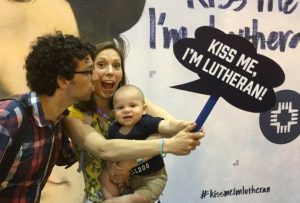 While not true for all church workers, it may sound familiar to some. In my family, almost every person is a medical professional, business owner, or a teacher. I found myself easily filling the teaching niche as I spent birthday money at teacher supply stores buying things for my “classroom”, collecting workbooks, name tags for desks, bulletin board supplies, etc. Whenever a teacher asked for a helper at school, my hand was the first up to assist a peer where they were struggling. Two of my “students” happened to live in my home. Both my older brother and sister were diagnosed with dyslexia at a young age and the areas where they were most challenged (reading, writing, spelling, and memory) happened to be where I most excelled. I read to them, proofread papers, checked homework, came up with memory study habits. Even through college, I edited their major papers while I was still in high school. As a high school student, I signed up for any opportunity to teach, from Vacation Bible School and Sunday School to tutoring and sports clinics.
While not true for all church workers, it may sound familiar to some. In my family, almost every person is a medical professional, business owner, or a teacher. I found myself easily filling the teaching niche as I spent birthday money at teacher supply stores buying things for my “classroom”, collecting workbooks, name tags for desks, bulletin board supplies, etc. Whenever a teacher asked for a helper at school, my hand was the first up to assist a peer where they were struggling. Two of my “students” happened to live in my home. Both my older brother and sister were diagnosed with dyslexia at a young age and the areas where they were most challenged (reading, writing, spelling, and memory) happened to be where I most excelled. I read to them, proofread papers, checked homework, came up with memory study habits. Even through college, I edited their major papers while I was still in high school. As a high school student, I signed up for any opportunity to teach, from Vacation Bible School and Sunday School to tutoring and sports clinics.
Yet despite how obvious the call to teach, like many kids, my reaction was to fight these instincts and the call simply because I wanted to be unique. It wasn’t because I didn’t respect my teachers or consider them originals. In 4th grade, Mrs. Carl poured into my life, constantly encouraging me in my joy of reading and writing, even helping submit my work to young writer’s publications. She taught me how to better explain concepts to my peers and even engaged me with higher level reading on my own so that I could keep growing in my skills. In middle school, I walked into Mrs. Beaty’s classroom and knew what it was like to belong. She got me and encouraged me to be a strong, independent student who used her gifts to help those around her. My high school experience brought intelligent, thought-provoking teachers who challenged me further to consider how my passions could be used in service to others. Mr. Steinbacher, Mr. Hendricks, Mr. and Mrs. Staude all fueled my love of learning and the joy of the lightbulb moment, but the three people who actually told me that I could do the same thing were my campus pastor, Pastor Cox, and two women at my church. Mrs. Borgmann who ran Sunday School would ask almost weekly, “Why wouldn’t you want to do this every day?” and to be honest, I never had a good answer.
Then, after a random visit to Concordia Seward my senior year to watch a friend’s last football game, I came home and told my pastor’s wife, Beth Schult, “I think I’m going to Seward and I’m going to be a teacher.” Her response was a beautiful confirmation of the call, “Of course you are.” What was it about that simple weekend visit that made my vocation so clear? Certainly, the campus was inviting and people made it feel like home. Meeting with Dr. Roebke affirmed how intelligent teachers are. But above all, I heard from people, professors, and programs that our identity is in Christ crucified which frees us up to serve in whatever vocation we have passion and skill. Up until then, I was looking for my vocation to be my identity. This pressure actually drove me away from where my passions lay. I am forever grateful to Concordia for introducing me to that truth of the gospel and surrounding me with pastors and professors like Dr. Blanco, Dr. Meehl, Dr. Reek, Dr. Ashby, Dr. Gernant, Dr. Moulds, Pastor Bo, the list goes on, while studying who constantly drew me back to the truth that our identity is in Christ.
